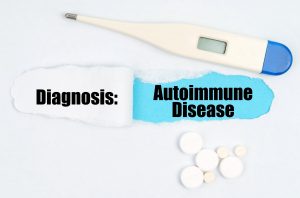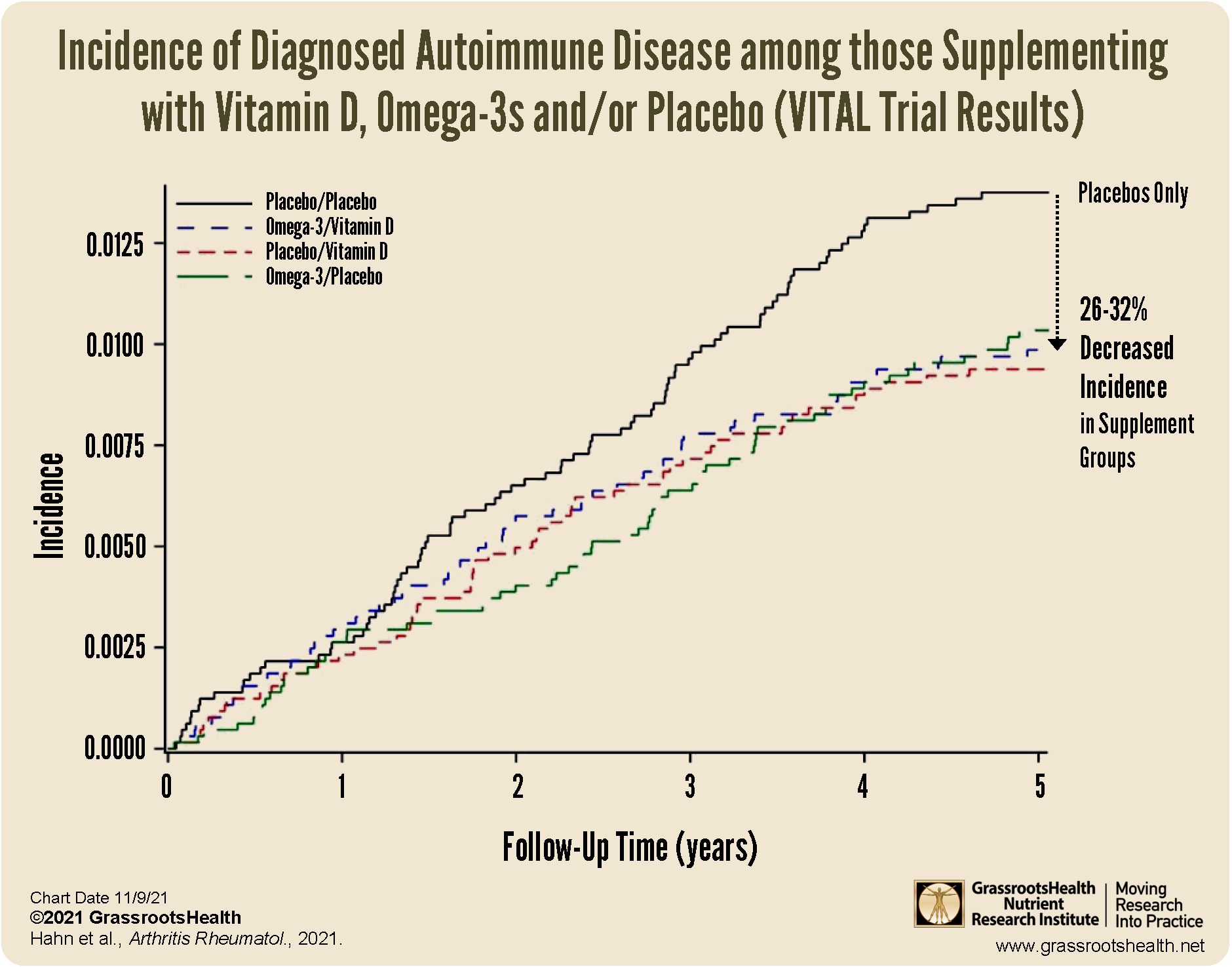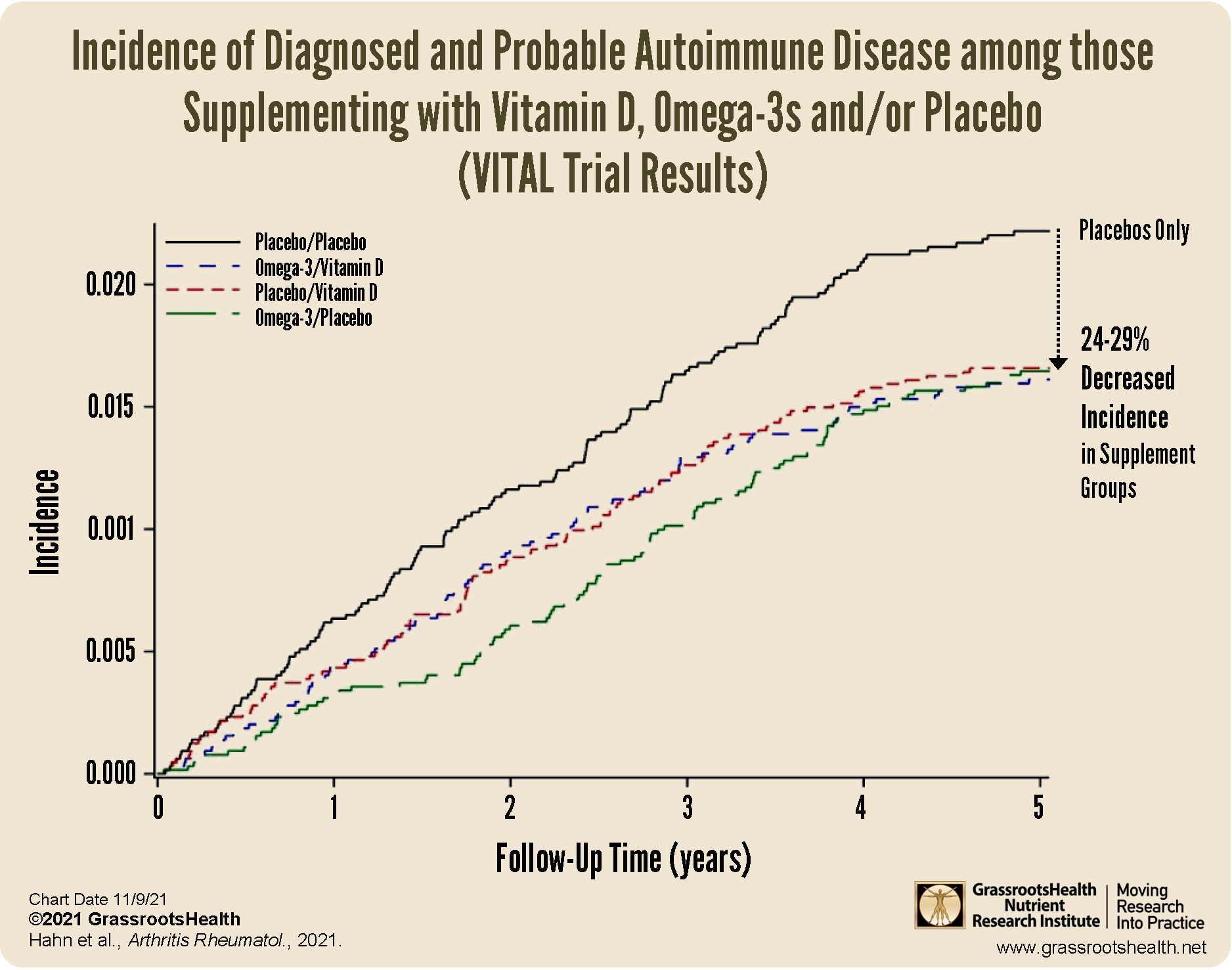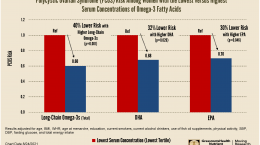Published on November 9, 2021
New results from the VITAL Trial showed vitamin D and/or omega-3 supplementation reduced autoimmune disease incidence by 25-30% over 5 years
Key Points
- A new analysis of VITAL Trial data shows a 25-30% decreased incidence of autoimmune disease diagnosis among those taking vitamin D and/or omega-3s vs only placebos, during an average follow-up of 5.3 years
- There was a 39% decreased incidence of diagnosed autoimmune disease among those taking vitamin D vs placebo, when diagnosis during the first 2 years was excluded (allowing time for vitamin D to take effect)
- The study only supplemented with 2000 IU vitamin D per day and/or 1000 mg omega-3 fatty acids per day, without adjusting intake to reach target levels – additional benefits may have been achieved if enough supplement was given to reach a target vitamin D level of 40-60 ng/ml (100-150 nmol/L) and/or an Omega-3 Index of at least 8%
 A new analysis from data gathered during the VITAL trial, looking at the relationship between supplementation with vitamin D and/or omega-3 fatty acids and the incidence of autoimmune diseases, has now been released. The analysis included data from 25,871 participants (average age 67 years old) who were followed for a median of 5.3 years. The primary outcome studied was the total incidence of all autoimmune diseases, including rheumatoid arthritis, polymyalgia rheumatica, autoimmune thyroid disease, psoriasis, and all others. Probable diagnoses of autoimmune diseases (cases that lacked enough medical record data to confirm existing symptoms and evidence of autoimmune disease) was also tracked and reported on; both are reviewed below.
A new analysis from data gathered during the VITAL trial, looking at the relationship between supplementation with vitamin D and/or omega-3 fatty acids and the incidence of autoimmune diseases, has now been released. The analysis included data from 25,871 participants (average age 67 years old) who were followed for a median of 5.3 years. The primary outcome studied was the total incidence of all autoimmune diseases, including rheumatoid arthritis, polymyalgia rheumatica, autoimmune thyroid disease, psoriasis, and all others. Probable diagnoses of autoimmune diseases (cases that lacked enough medical record data to confirm existing symptoms and evidence of autoimmune disease) was also tracked and reported on; both are reviewed below.
Supplementation with Vitamin D and/or Omega-3s Reduced Autoimmune Disease Incidence
During the time of the study, there was a
- 22% decreased incidence of diagnosed autoimmune disease among those taking vitamin D vs placebo (p=0.04)
- 39% decreased incidence of diagnosed autoimmune disease among those taking vitamin D vs placebo, when diagnosis during the first 2 years was excluded (allowing time for vitamin D to take effect; p=0.005)
- 15% decreased incidence of diagnosed autoimmune disease among those taking omega-3 fatty acids vs placebo (p=0.20)
- 25-30% decreased incidence among those taking vitamin D and/or omega-3s vs only placebos
The chart below illustrates the incidence of diagnosed autoimmune diseases among each group during the time of the study.
As you can see, the black line at the top (showing disease incidence among those taking only placebos) is much higher at the end of the 5.3 year follow up than the lines showing results for all other groups (taking either vitamin D, omega-3s, or both). This chart illustrates a 31-32% decreased incidence of any diagnosed autoimmune disease among those taking vitamin D with or without omega-3s versus only placebos.
This second chart shows the incidence of both diagnosed and probable autoimmune disease during the study follow-up time.
Again, the black line is much higher at the end of the study compared to all other groups, with the greatest effect showing a 29% decreased incidence for those taking both vitamin D and omega-3s versus only placebos.
The authors conclude
“Supplementation for 5 years with vitamin D3 and/or n-3 fatty acids reduced incident autoimmune disease by 25-30% in older adults vs. those who received neither supplement. The effect of vitamin D3 appeared stronger after 2 years of supplementation.”
How much vitamin D and omega-3s?
It is important to note that, for the VITAL study, the vitamin D supplementation group was given 2000 IU of vitamin D per day, and this analysis did not compare resulting vitamin D levels to disease incidence, which is essential due to the varying response of individuals to vitamin D supplementation. To get to a vitamin D serum level of 40 ng/ml (100 nmol/L), our scientists’ panel’s minimum recommendation, it would take 5000 IU/day to get approximately 82% of the population to that level – that’s more than twice the amount given during the VITAL trial. Also, studies suggest a level closer to 60 ng/ml may be of greatest benefit to those with or trying to prevent autoimmune disease.
The omega-3 group was supplementing with 1000 mg omega-3 fatty acids per day; similarly, the resulting blood levels of omega-3s, using measurements such as the Omega-3 Index, was not considered in the analysis.
Measure Your Vitamin D and Omega-3 Levels to Make Sure You Are Getting Enough
 Having and maintaining healthy vitamin D, omega-3, and other nutrient levels can help improve your health now and for your future. Choose which to measure, such as your vitamin D, omega-3s, and essential minerals including magnesium and zinc, by creating your custom home test kit today. Take steps to improve the status of each of these measurements to benefit your overall health. You can also track your own intakes, symptoms and results to see what works best for YOU.
Having and maintaining healthy vitamin D, omega-3, and other nutrient levels can help improve your health now and for your future. Choose which to measure, such as your vitamin D, omega-3s, and essential minerals including magnesium and zinc, by creating your custom home test kit today. Take steps to improve the status of each of these measurements to benefit your overall health. You can also track your own intakes, symptoms and results to see what works best for YOU.
Enroll and test your levels today, learn what steps to take to improve your status of vitamin D (see below) and other nutrients and blood markers, and take action! By enrolling in the GrassrootsHealth projects, you are not only contributing valuable information to everyone, you are also gaining knowledge about how you could improve your own health through measuring and tracking your nutrient status, and educating yourself on how to improve it.


 Click to Enlarge & Print
Click to Enlarge & Print Click to Enlarge & Print
Click to Enlarge & Print


